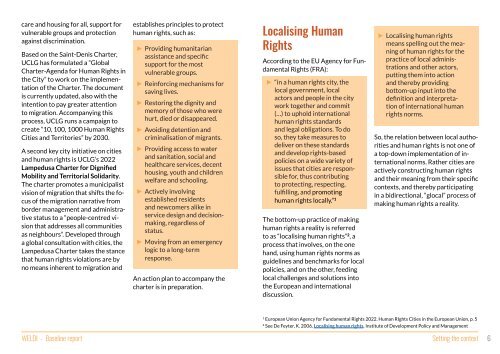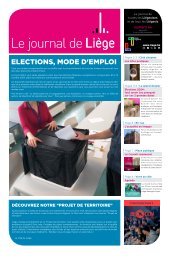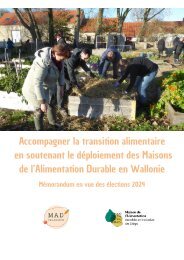You also want an ePaper? Increase the reach of your titles
YUMPU automatically turns print PDFs into web optimized ePapers that Google loves.
care and housing for all, support for<br />
vulnerable groups and protection<br />
against discrimination.<br />
Based on the Saint-Denis Charter,<br />
UCLG has formulated a “Global<br />
Charter-Agenda for Human Rights in<br />
the City” to work on the implementation<br />
of the Charter. The document<br />
is currently updated, also with the<br />
intention to pay greater attention<br />
to migration. Accompanying this<br />
process, UCLG runs a campaign to<br />
create “10, 100, 1000 Human Rights<br />
Cities and Territories” by 2030.<br />
A second key city initiative on cities<br />
and human rights is UCLG’s 2022<br />
Lampedusa Charter for Dignified<br />
Mobility and Territorial Solidarity.<br />
The charter promotes a municipalist<br />
vision of migration that shifts the focus<br />
of the migration narrative from<br />
border management and administrative<br />
status to a “people-centred vision<br />
that addresses all communities<br />
as neighbours”. Developed through<br />
a global consultation with cities, the<br />
Lampedusa Charter takes the stance<br />
that human rights violations are by<br />
no means inherent to migration and<br />
establishes principles to protect<br />
human rights, such as:<br />
► Providing humanitarian<br />
assistance and specific<br />
support for the most<br />
vulnerable groups.<br />
► Reinforcing mechanisms for<br />
saving lives.<br />
► Restoring the dignity and<br />
memory of those who were<br />
hurt, died or disappeared.<br />
► Avoiding detention and<br />
criminalisation of migrants.<br />
► Providing access to water<br />
and sanitation, social and<br />
healthcare services, decent<br />
housing, youth and children<br />
welfare and schooling.<br />
► Actively involving<br />
established residents<br />
and newcomers alike in<br />
service design and decisionmaking,<br />
regardless of<br />
status.<br />
► Moving from an emergency<br />
logic to a long-term<br />
response.<br />
An action plan to accompany the<br />
charter is in preparation.<br />
Localising Human<br />
Rights<br />
According to the EU Agency for Fundamental<br />
Rights (FRA):<br />
► “in a human rights city, the<br />
local government, local<br />
actors and people in the city<br />
work together and commit<br />
(…) to uphold international<br />
human rights standards<br />
and legal obligations. To do<br />
so, they take measures to<br />
deliver on these standards<br />
and develop rights-based<br />
policies on a wide variety of<br />
issues that cities are responsible<br />
for, thus contributing<br />
to protecting, respecting,<br />
fulfilling, and promoting<br />
human rights locally.” 1<br />
The bottom-up practice of making<br />
human rights a reality is referred<br />
to as “localising human rights” 2 , a<br />
process that involves, on the one<br />
hand, using human rights norms as<br />
guidelines and benchmarks for local<br />
policies, and on the other, feeding<br />
local challenges and solutions into<br />
the European and international<br />
discussion.<br />
► Localising human rights<br />
means spelling out the meaning<br />
of human rights for the<br />
practice of local administrations<br />
and other actors,<br />
putting them into action<br />
and thereby providing<br />
bottom-up input into the<br />
definition and interpretation<br />
of international human<br />
rights norms.<br />
So, the relation between local authorities<br />
and human rights is not one of<br />
a top-down implementation of international<br />
norms. Rather cities are<br />
actively constructing human rights<br />
and their meaning from their specific<br />
contexts, and thereby participating<br />
in a bidirectional, “glocal” process of<br />
making human rights a reality.<br />
1<br />
European Union Agency for Fundamental Rights 2022. Human RIghts Cities in the European Union, p. 5<br />
2<br />
See De Feyter, K. 2006. Localising human rights. Institute of Development Policy and Management<br />
<strong>WELDI</strong> - Baseline <strong>report</strong><br />
Setting the context 6
















